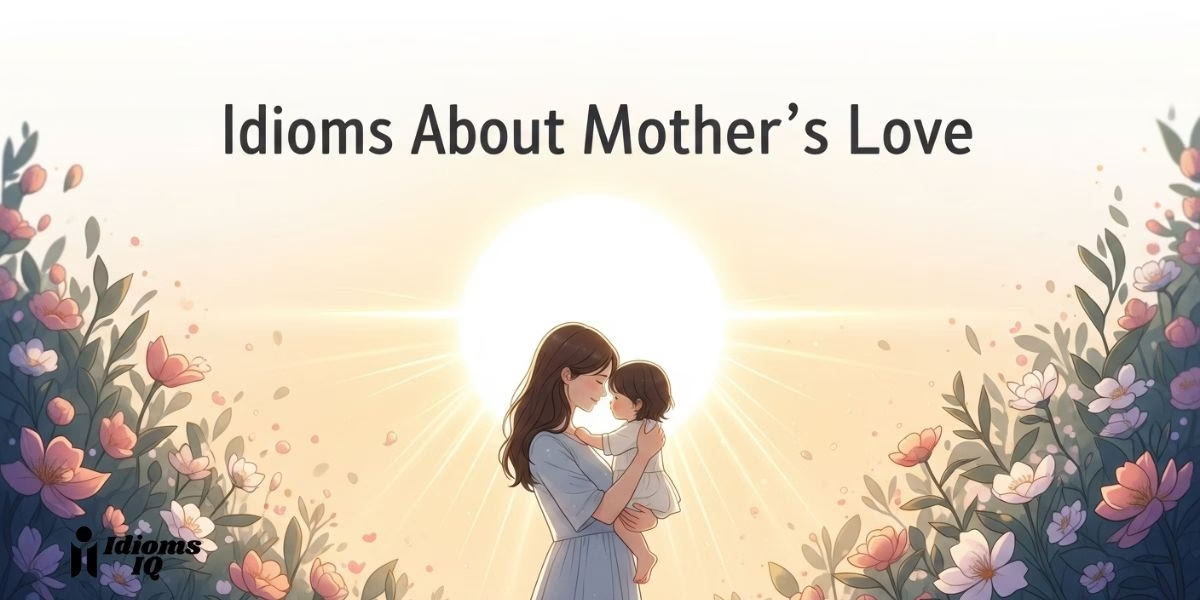
“Give sorrow words,” William Shakespeare wrote, “the grief that does not speak whispers the o’er-fraught heart and bids it break”. Sadness is a fundamental, universal human experience, yet finding the right words to articulate its depth can feel impossible. In these moments, language becomes a creative medium, a palette of words we use to paint a picture of our internal emotional landscape. Among the most powerful tools in this artistic toolkit are idioms.
Idioms are not just linguistic quirks; they are a “lingual art form,” a type of artistic expression that is deeply tied to the culture and community in which it develops. These phrases are “little packets of cultural information” that infuse our communication with color, vivid imagery, and profound emotional depth. When we say someone has a “heavy heart,” we are using a shared metaphor to convey a feeling that is both abstract and intensely physical.
This post explores 40 powerful idioms for sadness, sorrow, and heartbreak. It offers a deeper understanding of their creative power and provides a practical framework for using them to express complex feelings more fully. By examining these expressions, we can better appreciate how language helps us navigate one of life’s most challenging emotions.
Related: Similes for Pain
The Heart of the Matter: Idioms for Heartbreak and Deep Sorrow
The heart is a universal symbol for the center of emotion. It is no surprise, then, that many of the most potent idioms for sadness are anchored in this powerful metaphor. These expressions are effective because they connect an abstract feeling to a physical location, tapping into a deeply ingrained cultural understanding of where we “feel” love and pain.
The physicality of these idioms is not purely metaphorical; it often reflects the real physiological symptoms of grief, such as tightness in the chest and heart palpitations, which validates the sufferer’s experience.
A broken heart / Broken-hearted
- Meaning: The feeling of overwhelming emotional pain and suffering, especially after losing a loved one or ending a relationship.
- Creative Insight: This idiom evokes the powerful image of something precious and vital being shattered beyond repair. It perfectly captures the feeling of being emotionally incapacitated by grief, as if a core part of oneself has been rendered non-functional.
- Example Sentences:
- She was truly broken-hearted when her beloved grandfather passed away.
- The film’s tragic ending left the entire audience feeling broken-hearted.
A heavy heart
- Meaning: A feeling of being weighed down by sadness, sorrow, or grief.
- Creative Insight: This phrase paints a picture of sadness as a physical weight, a burden that slows a person down and makes every movement an effort. It speaks to the fatigue and emotional exhaustion that often accompany deep sorrow.
- Example Sentences:
- With a heavy heart, he packed up his belongings and left his childhood home for the last time.
- The team captain accepted the trophy with a heavy heart, knowing his injured teammate couldn’t be there to celebrate.
One’s heart sinks
- Meaning: To experience a sudden feeling of disappointment, unhappiness, or despair.
- Creative Insight: This idiom creates a visceral image of hope suddenly dropping away, like a stone falling into water. It captures the abrupt, gut-wrenching moment when bad news is received or a negative outcome is realized.
- Example Sentences:
- My heart sank when I saw the flashing red and blue lights in my rearview mirror.
- Her heart sank as she read the email and realized she had missed the application deadline.
A heart of lead
- Meaning: An unbearable feeling of heaviness and sorrow, suggesting that sadness has become a dense, immovable weight.
- Creative Insight: Lead is a notoriously heavy and toxic metal. This idiom intensifies the metaphor of a “heavy heart,” suggesting a sadness that is not just burdensome but also oppressive and poisonous to one’s spirit.
- Example Sentences:
- She walked away from the argument with a heart of lead, feeling the weight of their unresolved issues.
- Hearing the news of the tragedy left him with a heart of lead for the rest of the day.
Tear your heart out
- Meaning: To experience extreme, gut-wrenching emotional pain, as if one’s heart were being physically ripped from their chest.
- Creative Insight: This is a violent and powerful metaphor that illustrates a pain so intense it feels like a physical assault. It is reserved for moments of agonizing grief or betrayal, highlighting the brutal nature of some emotional wounds.
- Example Sentences:
- Watching the documentary about the war-torn region was enough to tear your heart out.
- The final scene of the play, where the hero says goodbye forever, tore his heart out.
Heart in one’s boots
- Meaning: A state of being utterly dejected, discouraged, and disheartened.
- Creative Insight: This idiom vividly portrays a feeling of being so low that one’s very center of emotion—the heart—has sunk to the lowest possible point. It combines the sinking feeling of disappointment with a sense of defeat.
- Example Sentences:
- After the company announced layoffs, he walked home with his heart in his boots.
- Her heart was in her boots when she realized she had lost the irreplaceable family heirloom.
Grieve your heart out
- Meaning: To mourn with deep, unrestrained, and intense emotion.
- Creative Insight: This expression gives permission for an all-encompassing display of grief. It suggests that mourning is a necessary process that should not be suppressed, encouraging a full and cathartic release of sorrow.
- Example Sentences:
- After the funeral, she went home and grieved her heart out for the friend she had lost.
- He needed a quiet space to grieve his heart out without feeling judged.
Die of a broken heart
- Meaning: A hyperbolic expression used to describe death caused by extreme emotional distress or grief, particularly after losing a loved one.
- Creative Insight: While often used figuratively, this phrase speaks to the profound connection between emotional and physical health. It acknowledges that the pain of grief can be so overwhelming that it feels life-threatening, a concept rooted in real stories of individuals who passed away shortly after a devastating loss.
- Example Sentences:
- The old man passed away just months after his wife of 60 years; the family said he died of a broken heart.
- She felt so lost after the breakup that she told her friends she might die of a broken heart.
A Flood of Feelings: Idioms That Capture Crying and Tears
Crying is a universal and often necessary expression of sadness. As the poet William Shakespeare suggested, “to weep is to make less the depth of grief”. The act of crying is a narrative in itself, with a beginning, a middle, and an end. The English language has developed a rich collection of idioms that map this emotional arc, capturing the full spectrum of shedding tears, from the quiet welling up of emotion to uncontrollable sobbing. This linguistic progression mirrors the emotional process of releasing pent-up feelings.
A lump in one’s throat
- Meaning: The tight, constricted feeling in the throat that often precedes crying, caused by strong emotion.
- Creative Insight: This is a remarkably accurate physiological description. The “lump” is the sensation of the glottis muscle contracting as the body tries to suppress tears while simultaneously preparing for an emotional outburst. The idiom perfectly captures the struggle to maintain composure.
- Example Sentences:
- He had a lump in his throat as he delivered the eulogy for his best friend.
- Watching her daughter walk down the aisle gave her a lump in her throat.
Eyes well up
- Meaning: The moment when tears begin to fill the eyes but have not yet fallen.
- Creative Insight: The verb “well up” creates the image of a spring or well filled with water, suggesting a natural and unavoidable upwelling of emotion. It describes the quiet, poignant moment just before the tears begin to flow.
- Example Sentences:
- Her eyes welled up with tears as she listened to the beautiful, sad song.
- His eyes welled up when he saw the surprise welcome party his friends had thrown for him.
Choke up
- Meaning: To become so emotional that it is difficult to speak clearly.
- Creative Insight: This idiom links the physical act of speaking with the overwhelming force of emotion. It describes the feeling of words being trapped or “choked” by the same tightness in the throat that precedes tears, highlighting a moment when feelings become too powerful for words.
- Example Sentences:
- The retired firefighter choked up while recounting the events of that fateful day.
- She choked up during her acceptance speech while thanking her parents for their support.
Reduce to tears
- Meaning: To cause someone to cry through overwhelming emotion, whether it be sadness, frustration, or even joy.
- Creative Insight: The word “reduce” suggests a breaking down of one’s emotional defenses. It implies that a person’s composure has been worn down until crying is the only response left, often in the face of intense pressure or profound sadness.
- Example Sentences:
- The manager’s relentless criticism reduced the new employee to tears.
- The kindness of the strangers who helped her after the accident reduced her to tears of gratitude.
Burst into tears
- Meaning: To begin crying suddenly and uncontrollably.
- Creative Insight: The word “burst” paints a picture of a dam breaking—a sudden, explosive release of pent-up emotion. It contrasts with the slow build-up of “eyes welling up,” describing a moment when control is abruptly lost.
- Example Sentences:
- Upon hearing the news, she burst into tears and couldn’t be consoled.
- The child burst into tears when his ice cream fell on the ground.
Cry one’s eyes out / Bawl your eyes out
- Meaning: To cry intensely and for a prolonged period of time.
- Creative Insight: This is a classic example of hyperbole, or exaggeration for effect. The impossible image of crying so much that one’s eyes fall out effectively communicates the sheer intensity and duration of the sobbing, painting a picture of complete emotional release.
- Example Sentences:
- He cried his eyes out all night after his team lost the championship game.
- She needed to be alone to bawl her eyes out after the difficult conversation.
Weep buckets / Cry a river
- Meaning: Hyperbolic phrases for crying profusely. “Cry a river” can also be used sarcastically to dismiss someone’s complaints.
- Creative Insight: Like “cry one’s eyes out,” these idioms use exaggeration to convey the volume of tears shed. The image of “buckets” or a “river” of tears creates a powerful visual of overwhelming sorrow. The sarcastic use of “cry me a river” adds a layer of complexity, showing how language can also be used to mock or minimize another’s pain.
- Example Sentences:
- They wept buckets while watching the tragic love story unfold on screen.
- After she told him her sad story, he just shrugged and said, “Cry me a river.”.
Crocodile tears
- Meaning: To shed false or insincere tears; to pretend to be sad or sympathetic.
- Creative Insight: This idiom originates from an ancient belief that crocodiles weep while luring or devouring their prey. It serves as a powerful metaphor for feigned sadness, used to describe manipulative or hypocritical displays of emotion. It reminds us that not all expressions of sorrow are genuine.
- Example Sentences:
- He shed crocodile tears at the funeral of the man he had cheated in business.
- Her apology was unconvincing; it was clear she was just crying crocodile tears to avoid punishment.
All cried out
- Meaning: To have cried so much that no more tears are left to shed; to be emotionally and physically exhausted from weeping.
- Creative Insight: This phrase marks the end of the crying narrative. It describes a state of emotional emptiness and physical depletion that follows an intense period of grieving. It’s a quiet, desolate state where the storm of emotion has passed, leaving a calm but sorrowful emptiness.
- Example Sentences:
- She sat in silence, her face puffy and her spirit weary; she was all cried out.
- After hours of mourning, the family finally all cried out and fell into a restless sleep.
Painting a Gloomy Picture: Idioms for Melancholy Moods and Appearances
Sadness is not just an internal feeling; it often manifests externally, changing one’s appearance and demeanor. This next group of idioms acts like an artist’s brush, painting a picture of a melancholy mood or a gloomy expression. Many of these phrases are observational, describing the visible signs of sadness in others.
This highlights a crucial social function of sadness: these expressions allow us to recognize distress in others, which is the first step toward offering the empathy and support that are essential for social connection and healing.
Feeling blue / To have the blues
- Meaning: The quintessential idiom for feeling sad, unhappy, or melancholic.
- Creative Insight: The association of the color blue with sadness has deep cultural roots, possibly linked to the color of tears, veins, or the coldness of rain. This idiom is a simple yet profound piece of color symbolism that has become synonymous with a state of melancholy.
- Example Sentences:
- Rainy Mondays always make me feel blue.
- She’s had the blues ever since her best friend moved away.
Down in the dumps
- Meaning: Feeling unhappy, dejected, and without hope.
- Creative Insight: This idiom conjures the image of being in a literal “dump”—a low, gloomy, and unpleasant place. It metaphorically places the sad person in a location that mirrors their internal state of hopelessness and low spirits.
- Example Sentences:
- He’s been down in the dumps since he lost his job.
- A little bit of good news would surely lift her out of being so down in the dumps.
Down in the mouth
- Meaning: Looking visibly unhappy or disappointed, with the corners of the mouth turned downward.
- Creative Insight: This is a purely descriptive idiom based on the most common facial expression of sadness—a frown. Unlike “down in the dumps,” which describes a mood, this phrase focuses on the physical evidence of that mood. It is often used when observing another person’s unhappiness.
- Example Sentences:
- Why are you so down in the mouth? Did you get some bad news?.
- She came back from the meeting looking very down in the mouth.
A face like a wet weekend
- Meaning: A British idiom describing a person with a very sad, miserable, or gloomy expression.
- Creative Insight: This phrase creates a wonderfully vivid and relatable image. It compares a person’s glum face to the disappointment of having one’s weekend plans ruined by cold, continuous rain. The expression perfectly captures a look of thorough and prolonged misery.
- Example Sentences:
- What’s wrong with him? He’s been walking around with a face like a wet weekend all morning.
- Cheer up! Don’t sit there with a face like a wet weekend.
In a funk
- Meaning: To be in a state of low mood, sadness, or lethargy, often without a clear reason.11
- Creative Insight: The word “funk” itself has an earthy, slightly unpleasant connotation, suggesting a state of being stuck in a gloomy, unmotivated mood. It’s less intense than deep depression but describes a persistent state of feeling “blah” or sluggish.
- Example Sentences:
- I’ve been in a funk ever since the project was canceled; I just can’t get motivated.
- The gloomy weather has put everyone in a bit of a funk today.
Out of sorts
- Meaning: Feeling slightly unwell, irritable, or not quite oneself, often accompanied by a low mood.
- Creative Insight: This idiom suggests a feeling of being misaligned or disordered, as if one’s usual temperament and well-being are “out of order.” It’s a gentle way to describe a general feeling of malaise that isn’t severe but is definitely noticeable.
- Example Sentences:
- She’s been a bit out of sorts since her trip and needs a few days to recover.
- Forgive my grumpy mood; I’m feeling a little out of sorts this morning.
In the doldrums
- Meaning: A period of stagnation, listlessness, low energy, and sadness.
- Creative Insight: The “doldrums” is a nautical term for a region near the equator where the winds are calm, often trapping sailing ships for weeks. The idiom brilliantly transfers this idea of being stuck, motionless, and without energy to an emotional state of boredom and melancholy.
- Example Sentences:
- After the holiday rush, the business was in the doldrums for a month.
- He’s been in the doldrums ever since he finished his last big project and is unsure what to do next.
Singing the blues
- Meaning: To openly complain or talk at length about one’s sadness, troubles, and misfortunes.
- Creative Insight: This idiom draws its name from the Blues musical genre, which is characterized by its soulful and often melancholic lyrics about hardship. To be “singing the blues” is to be performing a verbal monologue of one’s own sorrows.
- Example Sentences:
- He spent the whole evening singing the blues about his financial problems.
- I tried to cheer her up, but she just wanted to sit there and sing the blues.
A misery guts
- Meaning: A British slang term for a person who complains constantly, is perpetually pessimistic, and tends to bring down the mood of others.
- Creative Insight: This is a blunt and somewhat comical term that personifies misery. The word “guts” gives it a visceral, deep-seated quality, as if the person’s unhappiness comes from their very core. It’s used to describe a chronic complainer rather than someone experiencing temporary sadness.
- Example Sentences:
- Don’t be such a miserable guts! It’s a beautiful day outside.
- No one wants to be on a team with him because he’s known for being a real misery guts.
When Sorrow Overwhelms: Idioms for Intense Grief and Despair
Some losses are so profound they shake us to our core. For these moments of overwhelming sorrow, the English language has developed idioms that are appropriately intense and powerful. The violent, physical metaphors in this category—such as “knocked sideways,” “fall to pieces,” and “crushed”—are not mere exaggerations.
They reflect the traumatic and disorienting nature of deep grief. Grief is not a passive state of sadness but an active, often violent, force that disrupts one’s sense of self and reality. These expressions provide a vocabulary for a pain that often feels indescribable and should be used with the sincerity and care that such situations demand.13
Fall to pieces / Fall apart
- Meaning: To lose emotional control completely and become unable to cope with a situation.
- Creative Insight: This idiom uses the metaphor of a structure or object disintegrating. It vividly portrays the feeling that one’s entire emotional and psychological framework is collapsing under the weight of grief or stress.
- Example Sentences:
- When she heard of her pet’s death, she completely fell to pieces.
- He managed to stay strong during the crisis, but he fell apart afterward.
Knocked sideways / Knocked for six
- Meaning: A primarily British expression meaning to be utterly shocked, stunned, and emotionally devastated by an unexpected event.
- Creative Insight: This idiom paints a picture of being hit by an unseen force so powerful that it knocks one off their feet and leaves them disoriented. It perfectly captures the sudden, destabilizing shock that comes with tragic news. “Knocked for six” is a cricket term for hitting the ball out of the park, a powerful and decisive blow.
- Example Sentences:
- The news of his sudden illness knocked the whole family sideways.
- She was knocked for six when she was told her position had been eliminated.
Drowning in sorrow
- Meaning: To be completely consumed and overwhelmed by sadness, to the point of being unable to function.
- Creative Insight: Sorrow is imagined here as a vast, deep body of water. To be “drowning” in it suggests a feeling of being submerged, helpless, and struggling for air. It’s a powerful metaphor for the suffocating nature of profound grief.
- Example Sentences:
- In the months following the tragedy, the entire community was drowning in sorrow.
- She felt like she was drowning in sorrow and couldn’t see a way forward.
Beside oneself with grief
- Meaning: To be in a state of extreme, uncontrollable emotional distress.
- Creative Insight: This phrase cleverly suggests being so overcome with emotion that one is metaphorically “outside” of their normal, rational self. It depicts a state where grief has taken over, leading to frantic or inconsolable behavior.
- Example Sentences:
- The mother was beside herself with grief when she learned her son was missing.
- He was beside himself with grief and rage after the betrayal.
Carry a heavy burden
- Meaning: To live with a long-lasting emotional pain, responsibility, or guilt.
- Creative Insight: Similar to “a heavy heart,” this idiom frames emotional pain as a physical weight. However, “carrying a burden” implies a long-term, ongoing struggle—a weight that must be shouldered day after day. It speaks to the endurance required to live with chronic sorrow or guilt.
- Example Sentences:
- He has carried a heavy burden of guilt ever since the accident.
- Losing a child is a heavy burden to bear for any parent.
Take something hard
- Meaning: To be extremely and deeply upset by an event or piece of news.
- Creative Insight: This idiom portrays bad news as a physical blow. To “take it hard” means that the blow landed with full force, causing significant emotional damage. It describes a person who is not shrugging off the pain but is feeling its impact deeply.
- Example Sentences:
- The whole family took it very hard when their pet died.
- She took the criticism from her mentor quite hard and was quiet for days.
Be cut up about something
- Meaning: To be very emotionally hurt, distressed, or upset.
- Creative Insight: This expression likens emotional pain to being physically cut or wounded. It suggests a sharp, incisive pain that leaves a lasting mark. It’s a common way to express being deeply affected by a sad event.
- Example Sentences:
- He was really cut up about his friend moving to another country.
- She was still cut up about the argument they’d had weeks ago.
Sink into despair
- Meaning: To gradually lose all hope and become consumed by deep, profound sadness.20
- Creative Insight: Despair is imagined as a dark, murky pit or quicksand. The verb “sink” suggests a slow, passive, and helpless descent into this state of hopelessness. It captures the feeling of being pulled down by sadness with no strength to resist.
- Example Sentences:
- After months of unemployment, he began to sink into despair.
- It is important to seek help before one sinks too deeply into despair.
Crushed / Devastated
- Meaning: Feeling emotionally and mentally shattered by a traumatic event, loss, or disappointment.
- Creative Insight: These words describe total destruction. To be “crushed” is to be broken by an immense weight, while to be “devastated” is to be laid to waste, like a landscape after a storm. Both idioms convey a sense of being completely overwhelmed and emotionally annihilated.
- Example Sentences:
- She was absolutely crushed when she didn’t get into her dream university.
- The community was devastated by the news of the factory closing down.
Soul-destroyed
- Meaning: To experience a loss or betrayal so profound that it feels as if it has damaged one’s very essence or spirit.
- Creative Insight: This is one of the most powerful expressions for grief. It goes beyond emotional pain to suggest a spiritual or existential wound. It describes a sorrow that changes a person on a fundamental level, making them feel that a core part of their identity has been destroyed.
- Example Sentences:
- He felt soul-destroyed by the betrayal of his most trusted friend.
- Years of working in that toxic environment left her feeling completely soul-destroyed.
From Words to Art: A Creative Practice Exercise
Now that these linguistic tools have been explored, it is time to move from passive learning to active creation. Idioms are the building blocks used by writers and artists to convey deep emotion and create vivid characters. This exercise is a chance to practice using them.
The Challenge:
Choose one of the three emotionally charged scenarios below. Write a short paragraph (3-5 sentences) describing the person’s feelings. The goal is to use at least two idioms from this article to show, not just tell, the emotion.
- Scenario 1 (Disappointment): A young musician receives a rejection email from their dream conservatory.
- Scenario 2 (Grief): An elderly man sits on a park bench, holding the empty collar of his dog that recently passed away.
- Scenario 3 (Heartbreak): A person finds an old photograph of their ex-partner and is flooded with bittersweet memories.
Example Solution (for Scenario 1):
Leo stared at the screen, the words blurring together. His heart sank as the phrase “we regret to inform you” confirmed his fears. Leaning back, he felt utterly down in the dumps, the melody he’d been composing now sounding hollow and distant.
Quick Reference Guide: 40 Idioms for Sadness at a Glance
This table provides a useful summary for quick review, helping to find the perfect idiom when writing or speaking.
| Idiom | Brief Meaning | Emotional Category |
| A broken heart | Overwhelming emotional pain from loss | Heartbreak & Sorrow |
| A heavy heart | Weighed down by sadness or grief | Heartbreak & Sorrow |
| One’s heart sinks | Sudden disappointment or despair | Heartbreak & Sorrow |
| A heart of lead | Unbearable feeling of heaviness from sadness | Heartbreak & Sorrow |
| Tear your heart out | Experiencing extreme, gut-wrenching pain | Heartbreak & Sorrow |
| Heart in one’s boots | Feeling utterly dejected and discouraged | Heartbreak & Sorrow |
| Grieve your heart out | To mourn with deep, unrestrained intensity | Heartbreak & Sorrow |
| Die of a broken heart | Hyperbole for dying from extreme grief | Heartbreak & Sorrow |
| A lump in one’s throat | The tight feeling before you cry | Crying & Tears |
| Eyes well up | When tears begin to fill the eyes | Crying & Tears |
| Choke up | Becoming too emotional to speak clearly | Crying & Tears |
| Reduce to tears | To be made to cry by something overwhelming | Crying & Tears |
| Burst into tears | To suddenly start crying | Crying & Tears |
| Cry one’s eyes out | To cry intensely and for a long time | Crying & Tears |
| Weep buckets / Cry a river | Hyperbolic phrases for crying a lot | Crying & Tears |
| Crocodile tears | To fake sadness by crying insincerely | Crying & Tears |
| All cried out | To have no more tears left to shed | Crying & Tears |
| Feeling blue | The classic idiom for feeling sad | Melancholy & Moods |
| Down in the dumps | Feeling unhappy and without hope | Melancholy & Moods |
| Down in the mouth | Looking visibly unhappy | Melancholy & Moods |
| A face like a wet weekend | A very sad or miserable expression | Melancholy & Moods |
| In a funk | A state of low mood and lack of motivation | Melancholy & Moods |
| Out of sorts | Feeling unwell or not quite yourself | Melancholy & Moods |
| In the doldrums | A period of stagnation and low energy | Melancholy & Moods |
| Singing the blues | To complain about one’s sadness | Melancholy & Moods |
| A misery guts | A person who complains constantly | Melancholy & Moods |
| Fall to pieces / Fall apart | To lose emotional control and be unable to cope | Intense Grief & Despair |
| Knocked sideways | To be shocked and emotionally devastated | Intense Grief & Despair |
| Drowning in sorrow | To be completely overwhelmed by sadness | Intense Grief & Despair |
| Beside oneself with grief | In a state of extreme, uncontrollable distress | Intense Grief & Despair |
| Carry a heavy burden | To live with long-lasting emotional pain | Intense Grief & Despair |
| Take something hard | To be extremely upset by something | Intense Grief & Despair |
| Be cut up about something | To be very emotionally hurt or upset | Intense Grief & Despair |
| Sink into despair | To lose all hope and become deeply sad | Intense Grief & Despair |
| Crushed | Feeling emotionally shattered | Intense Grief & Despair |
| Devastated | Feeling emotionally shattered | Intense Grief & Despair |
| Soul-destroyed | A loss that feels damaging to one’s essence | Intense Grief & Despair |
| Bawl your eyes out | To cry intensely and for a long time | Crying & Tears |
| Knocked for six | To be shocked and emotionally devastated | Intense Grief & Despair |
| To have the blues | To feel sad or melancholic | Melancholy & Moods |
Conclusion:
Idioms are a form of communal art, crafted over generations to give voice to our most profound experiences. They provide a rich and nuanced vocabulary for the complex journey of sadness, validating our emotional and even physical responses to loss. The very act of naming our feelings is a crucial step toward processing them.
By learning this “language of sorrow,” we equip ourselves with the tools not only to understand our own hearts but also to connect with and offer comfort to others. While sorrow is an inevitable part of life, these expressions remind us that we are not alone in our feelings. As language gives shape to our pain, it also opens a path toward healing. In the end, perhaps a “broken heart” doesn’t mean you’re broken. The crack is there to let the light pour in”.






